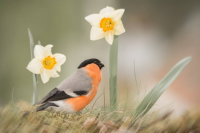1、 Soil
It has strong adaptability to land, barren resistance and low requirements for soil quality. The sandy loam with good drainage is more suitable for planting it. If possible, some rotten leaf soil can be mixed in the soil preparation to improve the soil quality and increase the soil fertility
2、 Temperature
The most suitable temperature for its growth is between 16-26 ℃, and the warm environment makes it grow well. At flowering stage, the ambient temperature should be controlled above 10 ℃. Put it indoors in winter to prevent it from frostbite
3、 Watering
It has high requirements for water, especially in summer, it should be watered more, and the basin soil should be avoided from being too dry. However, the soil should not be too wet for a long time to avoid root rot. In other seasons, water once a day in the morning
4、 Illumination
A sunny environment is more conducive to its growth. Give it at least 4 hours of sunshine every day. In summer, we should give it a certain shade to prevent exposure to the hot sun, otherwise it will lead to withered leaves and soft branches
5、 Fertilization
It likes fertile land and has a high demand for fertilizer. A thin layer of fertilizer can be laid before planting and fertilized once every half a month during the growth period. It is best to use rotten compound fertilizer
6、 Diseases and insect pests
Its powdery mildew mainly occurs on leaves and young shoots. Generally, it may begin to occur in June, and white powder layer will appear on the leaves. In case of any problem, it shall be handled in time to avoid the expansion of disease scope

 jackfruit
jackfruit snake plant
snake plant hibiscus
hibiscus hydrangea
hydrangea lavender
lavender Green roses climb al...
Green roses climb al... If you don't pay att...
If you don't pay att... Management of four g...
Management of four g...

































